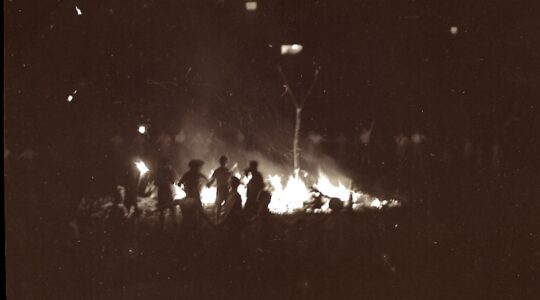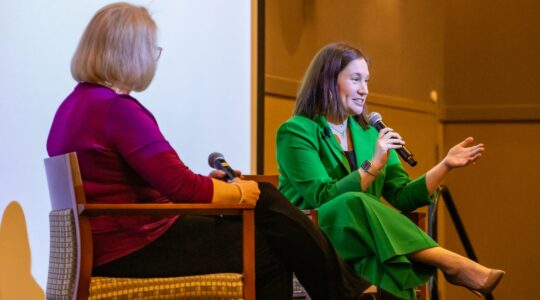This article was produced as part of JTA’s Teen Journalism Fellowship, a program that works with Jewish teens around the world to report on issues that affect their lives. For other perspectives on picking a college amidst the war in Gaza, go here.
(JTA) — On a 70-degree day last week, I toured Brown University. I found myself falling in love with the school and could easily picture myself working on the student newspaper, studying in the quad and grabbing coffee from the dining hall. The only thing I couldn’t quite imagine, though, was navigating around the “Gaza Solidarity Encampment” on the main quad of campus (before the students agreed to disperse after discussions between university leaders and protesters).
The calls of “free Palestine” and the beating drums made it hard to hear my tour guide. And the beaming sun reflecting off the green fabric of the “liberated zone” tents partly blinded me. I found myself not only distracted, but angry. How could these students, who seemed to be having the time of their lives in the tents, be so against the State of Israel? And who was I, a free speech advocate, to find myself wishing that the protests would stop so that I could enjoy my tour?
The next day, I attended a “Bring Them Home” rally outside of Columbia University calling for an immediate return of Israelis (and other nationals) being held by Hamas. I could not see or hear the encampment inside the closed gates at 116th Street, though I had, of course, seen distressing images of the protesters activity all over my social media and news feeds. I was handed a poster bearing the name of one of the 133 hostages still being held by Hamas, and, for maybe the ten-thousandth time this year, I sang along to “Acheinu Kol Beit Yisrael” (“our brothers, the whole house of Israel”) and other Hebrew songs that have become anthems for freeing the hostages.
After months of rallies and the knowledge that our gathering was half the size of the encampment, it was no surprise that energy of the “Bring Them Home” rally seemed to be diminished. What I was not expecting, though, what seemed glaringly amiss, was that the crowd did not appear to be typically of college-age. On the contrary, those in attendance were either upwards of 30 or under 4. I wonder if Jewish students had, indeed, gone home out of fears for their safety, as a campus rabbi at Columbia had recently warned students to do.
Back at home, I began to consider the articles I’ve read saying that Jewish students should no longer apply to Ivy League schools. I thought about discussions that I have had with my high school peers about going to college in Israel. I read closely the update that Brandeis University had recently extended its transfer application deadline, intending to offer a safe haven for Jewish students who no longer want to be on their campuses that were full of “Jew-Hatred.”
I do not blame members of my community for their fear, and I understand why they may want to remain in safe Jewish bubbles throughout their college experience. Yet, the experiences that I had at Brown and Columbia this week did little to dissuade me from applying to these schools. I grew up imagining myself majoring in journalism at a top-tier university, engaging in conversation with a diverse group of peers, and returning to Shabbat dinner at my parents when I needed to. I do not intend to give up that, admittedly lofty, dream, and I hope that the rest of the Jewish community is able to continue showing up to these universities alongside me.
Despite our fear, it is ever more important at a time like now for the Jewish community to continue expanding our educational horizons and building successful Jewish leaders. I will continue to pursue an education at any school I wish to attend, and I will certainly not yet the fear of discrimination prevent me from receiving the premier education that my peers and I deserve.







